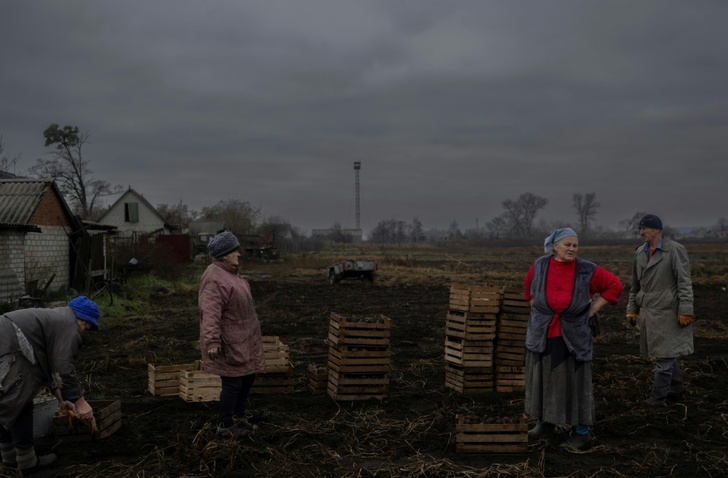Residents of recaptured villages in eastern Ukraine who have lived through Russian occupation and near constant shelling say they now feel "abandoned" by Ukrainian officials and still lack running water, gas and electricity.
In the Donbas region, the villages of Yampil and Zarichne, retaken by Ukrainian troops at the end of September, still bear the scars of heavy fighting.
Many houses are in ruins, and the forest surrounding Yampil is full of charred pine trees and destroyed armoured vehicles.
Those who remained in their homes in this primarily Russian-speaking region are mostly older people.
They say they are still struggling even after the return of Ukrainian troops.
In Yampil, Nina Marchenko, 72, tells AFP a missile damaged her home during the fighting.
It "went through the roof, through the wall and destroyed the top of the underground storage room," she says, though she and her family were luckily sheltering in a neighbour's house at the time.
Marchenko, her 50-year-old son Andriy and his wife Lyudmila have since come back to live in their house and have mended the roof themselves.
"We were told that we shouldn't wait for local authorities to do it," Marchenko says.
One bedroom is unusable because "there are water leaks everywhere" when it rains, she says.
So the family is crammed into the kitchen and living room, with wallpaper peeling off the ceiling due to water damage.
- 'We beg for bread' -
The money in the family's bank accounts is no help.
They still cannot withdraw it, despite authorities' efforts to restore some normality.
So the family lives on pasta and rice, sometimes with tinned meat or pate when they receive humanitarian aid.
They have not had electricity since April.

Thankfully, they can still draw water from their well.
"Six missiles fell in the garden. They weren't Russian, they were Ukrainian," Andriy says.
His mother has one wish for the future.
"I just pray to God: 'please stop the war'. There is nothing I want more than this," his mother says, with tears in her eyes.
To the south, in a field in Zarichne, three women and a man have filled a wooden box with around two dozen freshly dug-up potatoes.
They all refuse to give their names.
"We don't believe anyone. Everyone is lying to us. Russia is lying, Ukraine is lying," says one woman wearing a blue scarf over her hair.
"Everyone kept promising us mountains of gold. But in the end, we were abandoned," she says.
"So we beg for bread. We go to the soldiers and ask 'give us bread'. The authorities are nowhere to be seen. They're afraid to come here because of shelling."
A strike destroyed the house where her two small grandchildren were living, she says, though they survived and have now left with their parents.
"It's the Ukrainians who fired those missiles... There were no Russians here," the woman says, claiming there were only separatist fighters at a checkpoint.
- Unexploded cluster bomb -
Opposite the field, 37-year-old Sergiy points out a small grey cylinder lying on the ground outside his house.
A small white flag is planted next to it.
The cluster bomb landed without exploding during strikes on November 3, he says. He has asked local authorities to come and take it away, but they have still not come.

"Most of the time, they stay inside. Sometimes they go outside -- but with us," he says.
The authorities "promised to pay, but no one has paid yet. They're not even giving out humanitarian aid, and we've been liberated for one month," he says.
Local authorities are not fixing damage to private properties and have postponed most public works until spring as winter approaches.
Explosions still echo in the valley: the front line is only 10 kilometres (6 miles) to the east.
"Russians are hitting the bridge over there," Sergiy says, pointing to the river that runs by the village.
From there, the road east leads to the small town of Kreminna, about 20 kilometres away, which the Ukrainians are seeking to recapture from the Russians.
epe-brw-am/ah
© Agence France-Presse
Your content is great. However, if any of the content contained herein violates any rights of yours, including those of copyright, please contact us immediately by e-mail at media[@]kissrpr.com.
Source: Story.KISSPR.com

